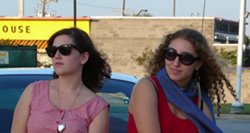
My mother, journalist, feminist and cultural critic Ellen Willis, died a year ago today. I’ve been honoring her by reliving the time following her death—obsessively sifting through writing by her and about her. After the funeral, it was sensory overload for weeks on end, not only because responses to death are emotional hurricanes, but because every lazy, indeterminate goal that I had to be both a writer and a feminist suddenly came alive. I began poring over my mother’s writing, filling in the blanks in my knowledge about the women’s movement. I learned how it had literally started from a few women realizing they had common ground and deciding to talk about it. It was a crash course in American feminism, a history lesson in the form of anecdotes, tearful elegies, and primary documents.
At the same time, people who had been affected by my mother’s work all felt drawn to me, to fill the space Mom had left behind. They handed me letters, old papers, photos, pamphlets from feminist conferences, old issues of The Village Voice containing scathing critiques in my mother’s weekly column. I had read my mother’s books in high school, and again in college, each time being moved by the clarity, wit, and subtlety of Mom’s writing but never feeling an urge to identify with the feminist part. But after November 9th, the feminist wheels in my head, once moving perfunctorily, began furiously churning. It was a mere couple weeks after this day last year, over eggs and mimosas in NYC, when GIRLdrive was born.
I knew that a day after she died, NPR had replayed an interview she did in 1989, but for some reason I never got around to listening to it. Every time I’d think of it, I would happen to be checking my email at home on my dad’s prehistoric computer, whose speakers are defunct. I’d think, ‘Tomorrow at work I’ll take a listen’ but would always forget. I stumbled upon it today, in the throes of this road trip, and discovered that it was mostly about how being a mother--I was 5 at the time--had affected her brand of feminism.
My heart stopped when I heard this part:
“I think Stanley [my father] and I do our best in good faith to try to share everything. But then there always are things, like I really have a driving phobia…and definitely I know that its connected with all sorts of things about female-ness. So Stanley does virtually all of the driving when we’re in the city together. Nona has been seeing this…At one point, she even said to me, ‘You have to have a penis to drive, right, Mama?’ I feel like this is really on my agenda as a big thing that I have to deal with… I try to make her understand that this is just my weirdness…Now she sort of sits in the drivers seat and she pretends that she’s driving and she really wants to learn to drive. The most important thing is that she should get the idea that it’s great for her to try to do.”
And I did get that idea—never questioned that I could get my license and have a car. Now, I am dependent on my driver’s license to finish the most important thing I’ve ever done in my life. I’m really hoping that, somehow, she can see that she did it right.
--Nona


4 comments:
I am really moved by Nona's commemoration of Ellen's death. What is particularly powerful is how this searing and tragic event has helped clarify her thinking about feminism, male/female relationships, and about Ellen herself. I was traveling on Friday November 9 but could not avoid the flood of memories about the three of us, but especially about Ellen's wit. I used to say to her that she was witty and not "funny". Her humor was dry and contained perceptions that remain for me indelible. She confided to me that she fervently hoped Nona would see the importance of our political and social values but would not follow her several phobias of which driving was emblematic of the degree to which liberation always remained partial and contested. Yet Ellen's spirit and her intellect were perhaps a model of freedom, one that I have tried to follow for the past twenty five years.
nona dear, thank you for this. i miss ellen more than i can say. i
knew how close we were, but in some sense i didn't know, because her
death has left such a huge emptiness where she used to be. i find
myself so often thinking, 'what would ellen do?' or 'what would ellen
say about *that*?'
but that--and in you, and in her writing--is how she lives
on.///susie linfield
This is such a beautiful entry. It's awing how some of the obstacles and weaknesses- large or small- that cripple one generation can become either insurmountable, or non-issues to their progeny, depending on the skill they're handled with. Your mother sounds amazing.
Hi, Nona- I was just messing about on Facebook and trying to remember everyone I ever knew and I thought of Ellen and then of you and found my way to GirlDrive and this post. I was a student of Ellen's in the first CRC class at NYU in 1995 and she was and is an exceptional influence on me. I last saw you when you were about 13, somewhere on West 3rd St. and even though it's probably weird to hear from someone you don't really know, I am so proud of you! You are truly honoring your mother in the deepest way and blazing your own trail at the same time. Best of luck with everything. Your writing/work is so valuable. - Kathleen Collins
Post a Comment